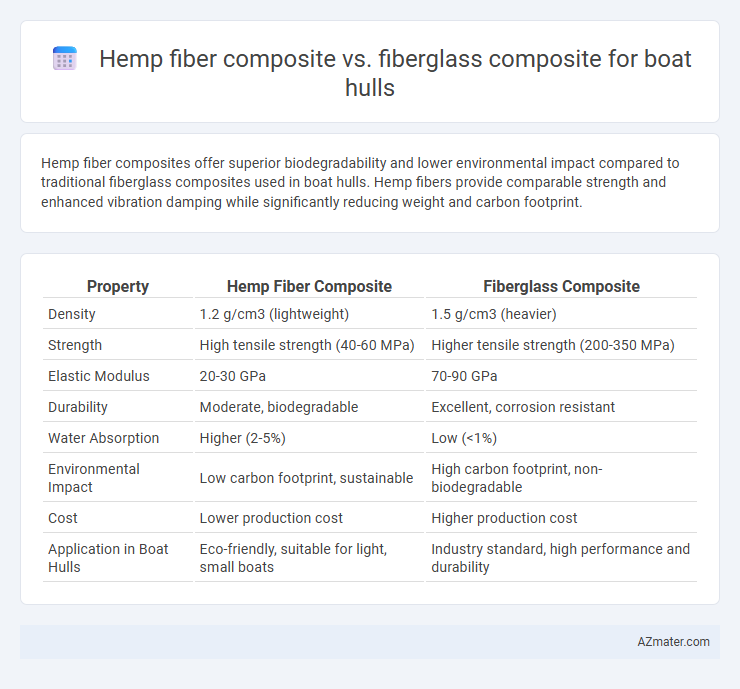Hemp fiber composites offer superior biodegradability and lower environmental impact compared to traditional fiberglass composites used in boat hulls. Hemp fibers provide comparable strength and enhanced vibration damping while significantly reducing weight and carbon footprint.
Table of Comparison
| Property | Hemp Fiber Composite | Fiberglass Composite |
|---|---|---|
| Density | 1.2 g/cm3 (lightweight) | 1.5 g/cm3 (heavier) |
| Strength | High tensile strength (40-60 MPa) | Higher tensile strength (200-350 MPa) |
| Elastic Modulus | 20-30 GPa | 70-90 GPa |
| Durability | Moderate, biodegradable | Excellent, corrosion resistant |
| Water Absorption | Higher (2-5%) | Low (<1%) |
| Environmental Impact | Low carbon footprint, sustainable | High carbon footprint, non-biodegradable |
| Cost | Lower production cost | Higher production cost |
| Application in Boat Hulls | Eco-friendly, suitable for light, small boats | Industry standard, high performance and durability |
Introduction: The Evolution of Boat Hull Materials
Hemp fiber composite and fiberglass composite represent significant advancements in boat hull materials, with hemp fiber offering a sustainable and lightweight alternative to traditional fiberglass. Hemp fiber composites provide excellent tensile strength, reduced environmental impact, and enhanced biodegradability compared to fiberglass, which is known for its durability and resistance to corrosion. The evolution of boat hull materials reflects a shift towards eco-friendly options like hemp fiber composites, which meet performance demands while promoting sustainability in marine applications.
Understanding Hemp Fiber Composite
Hemp fiber composites offer a sustainable alternative to traditional fiberglass composites in boat hull construction, featuring high tensile strength, low density, and excellent vibration damping properties. Hemp fibers are biodegradable and sourced from renewable plants, reducing environmental impact and landfill waste compared to the petroleum-based fiberglass. The natural fiber structure enhances impact resistance and energy absorption, making hemp composites increasingly attractive for lightweight, durable, and eco-friendly marine applications.
Key Properties of Fiberglass Composite
Fiberglass composites used for boat hulls offer high tensile strength, excellent corrosion resistance, and superior durability in marine environments. Their lightweight nature combined with impact resistance ensures enhanced performance and longevity under harsh sea conditions. The material's ability to withstand UV exposure and chemical attack further solidifies its preference over other composites in boat building.
Mechanical Strength: Hemp Fiber vs Fiberglass
Hemp fiber composites offer a tensile strength ranging from 300 to 600 MPa, providing excellent flexibility and impact resistance, whereas fiberglass composites typically exhibit higher tensile strength around 700 to 900 MPa with increased stiffness. The lower density of hemp fibers (approximately 1.5 g/cm3) compared to fiberglass (2.5 g/cm3) contributes to lighter boat hulls, enhancing fuel efficiency and handling. Despite fiberglass's superior strength and durability, hemp fiber composites present a sustainable alternative with competitive mechanical properties suitable for moderate load-bearing marine applications.
Weight and Density Comparison
Hemp fiber composites exhibit a lower density of approximately 1.2 g/cm3 compared to fiberglass composites, which typically range around 1.5 to 2.0 g/cm3, resulting in lighter boat hull structures. The reduced weight of hemp fiber composites enhances fuel efficiency and maneuverability while maintaining adequate mechanical strength for marine applications. This weight advantage positions hemp fiber as a sustainable alternative to traditional fiberglass in boat hull manufacturing.
Environmental Impact and Sustainability
Hemp fiber composites offer a significantly lower environmental impact than fiberglass composites due to their renewable nature and biodegradability, reducing landfill waste and microplastic pollution in marine environments. The cultivation of hemp requires less water, pesticides, and energy compared to the synthetic production of fiberglass, leading to a smaller carbon footprint throughout the boat hull's lifecycle. Hemp fiber composites also promote sustainability by enhancing recyclability and supporting carbon sequestration, making them a greener alternative for eco-conscious boat manufacturing.
Cost Analysis: Production and Maintenance
Hemp fiber composites for boat hulls offer lower production costs due to the renewable nature and local availability of hemp, reducing raw material expenses compared to fiberglass composites, which rely on energy-intensive glass fiber manufacturing. Maintenance costs for hemp fiber composites tend to be lower since hemp enhances resistance to water absorption and microbial degradation, decreasing the frequency of repairs and treatments relative to fiberglass, which can suffer from osmotic blistering and requires specialized upkeep. Overall, hemp fiber composites provide a cost-effective alternative in both production and long-term maintenance, promoting sustainable boat hull construction without compromising durability.
Durability and Resistance in Marine Environments
Hemp fiber composites offer exceptional durability and resistance to marine environments due to their natural resilience against saltwater corrosion and UV degradation, outperforming traditional fiberglass in resisting moisture absorption and fungal growth. Fiberglass composites, while strong and widely used, can suffer from osmosis and delamination issues over time when exposed to prolonged marine conditions. Hemp fiber composites provide a sustainable alternative with superior impact resistance and long-term structural integrity, making them ideal for eco-friendly boat hull construction.
Performance and Longevity on the Water
Hemp fiber composites offer superior impact resistance and flexibility compared to traditional fiberglass composites, resulting in enhanced durability and improved performance in rough water conditions. The natural hemp fibers provide better vibration dampening and environmental sustainability, reducing hull weight without compromising strength. Longevity-wise, hemp composites resist water absorption and resist rot, extending the hull's lifespan and minimizing maintenance over time compared to fiberglass.
Future Trends in Boat Hull Composite Materials
Hemp fiber composite is gaining traction in the marine industry due to its sustainability, lightweight properties, and improved vibration damping compared to traditional fiberglass composites. Future trends indicate a growing shift toward bio-based composites, with hemp fibers offering enhanced environmental benefits and comparable mechanical strength for boat hull applications. Advancements in resin technology and hybrid composite formulations are expected to further boost the performance and durability of hemp fiber composites, promoting their adoption over fiberglass in eco-conscious boat manufacturing.

Infographic: Hemp fiber composite vs Fiberglass composite for Boat hull
 azmater.com
azmater.com